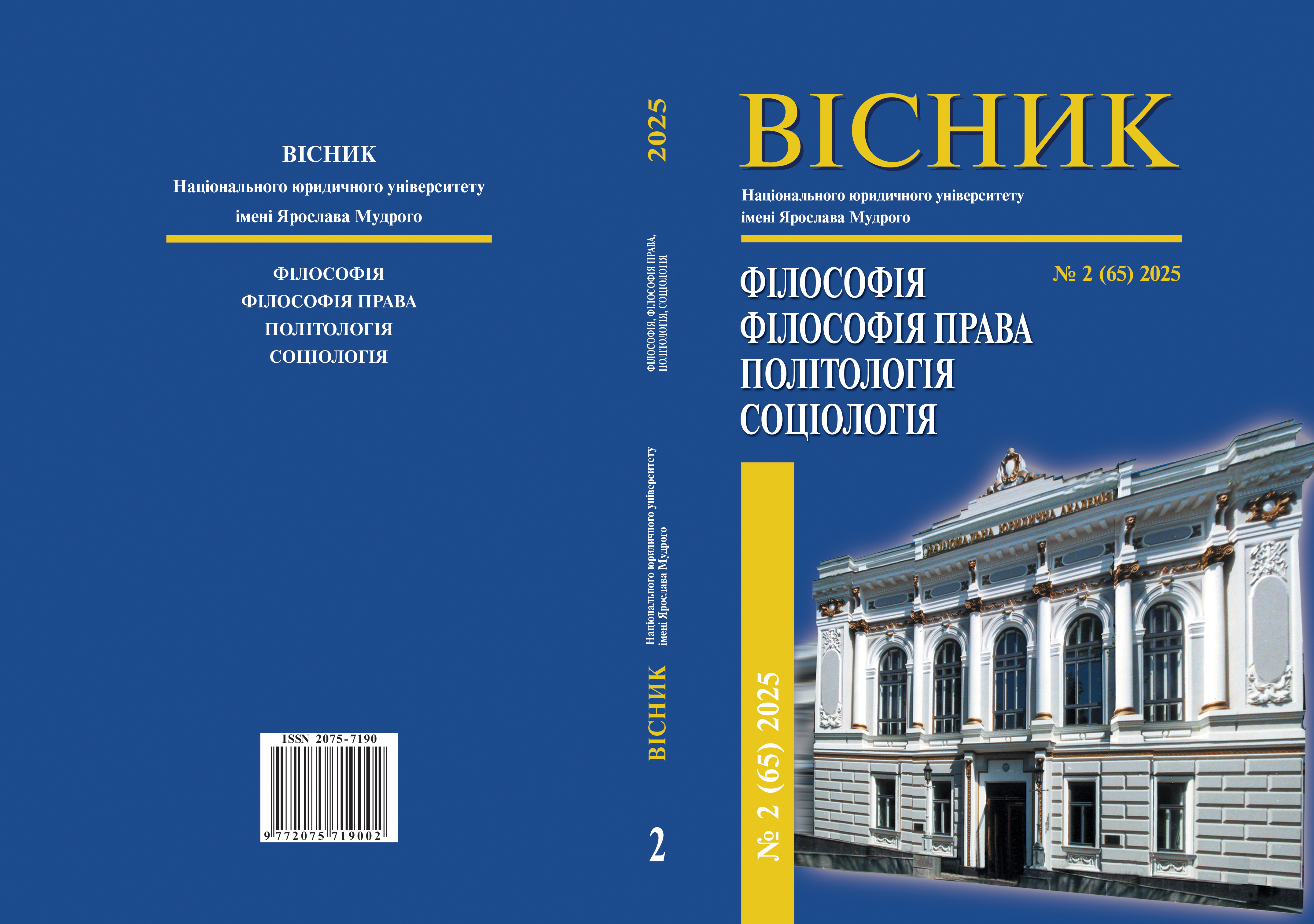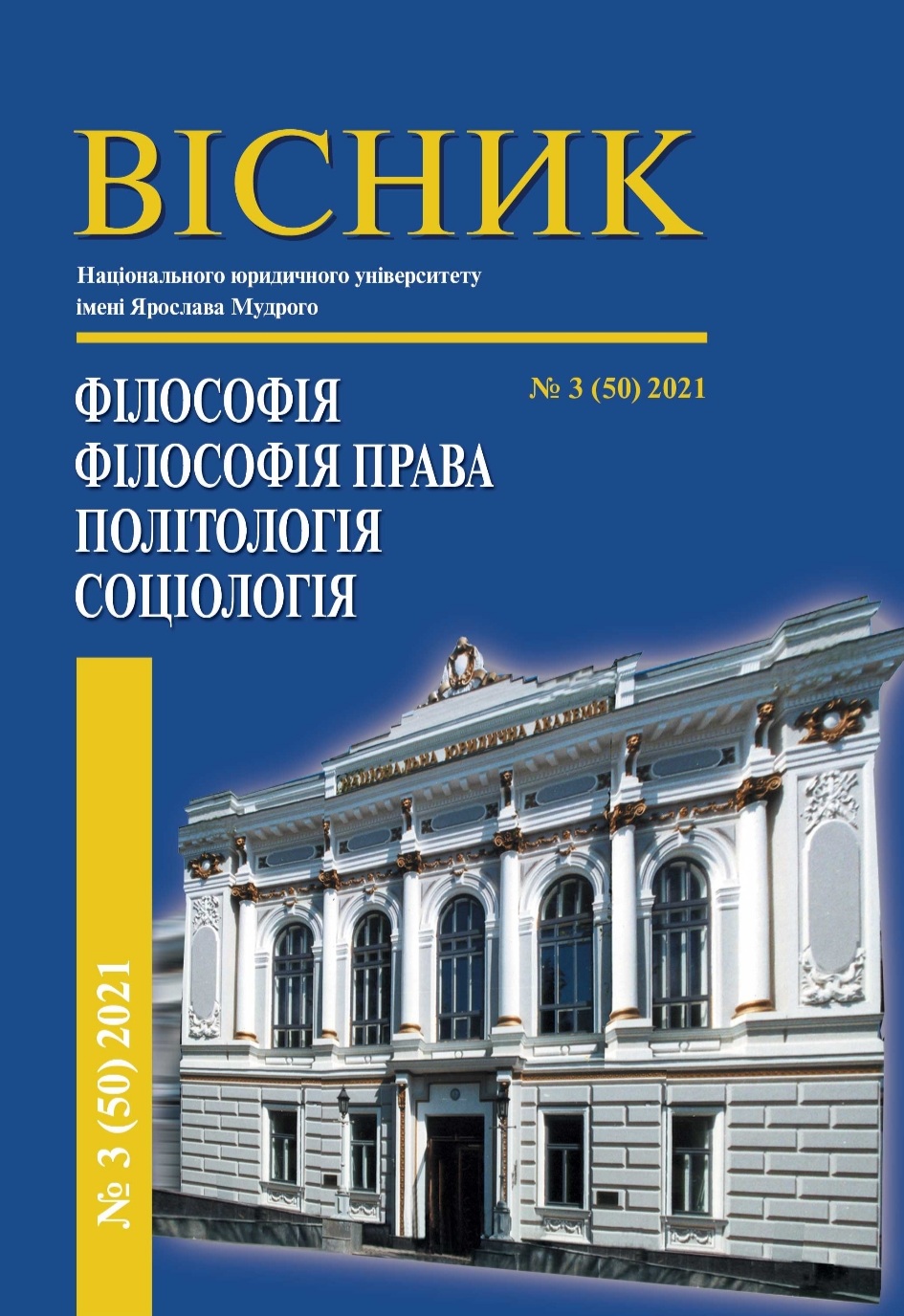ТЕХНОЛОГІЇ МІФОЛОГІЗАЦІЇ ЯК ІНСТРУМЕНТИ ФОРМУВАННЯ ПОЛІТИЧНОГО КОНСЕНСУСУ
DOI:
https://doi.org/10.21564/2663-5704.65.331789Ключові слова:
міфологізація, політичний консенсус, символічна реальність, архетипи, медійні технології, легітимація влади, соціальна згуртованістьАнотація
The study examines mythologization technologies as a means of shaping political consensus. It reveals that these technologies are based on the symbolic reinterpretation of reality through archetypes, emotionally charged imagery, and mythological constructs that influence public consciousness. The findings demonstrate that the key mechanisms of mythologization include the creation of collective narratives, the heroization of leaders, the construction of a hostile 'Other,' and the manipulation of temporal perception to legitimize power and mobilize society. These technologies not only shape political reality but are also actively employed to foster social cohesion, particularly in times of crisis or transitional processes.
Посилання
Vysotskyi, O. (2008). Virtualnist yak provedna forma lehitymatsiinoi polityky v dobu postmodernu. Politychnyi menedzhment – Political management, 6, 41–53. URL: http://nbuv.gov.ua/UJRN/PoMe_2008_6_6 [in Ukrainian].
Vysotskyi, O. (2020). Politychnyi imidzh: mifolohichni ta propahandystski vymiry formuvannia ta funktsionuvannia. Mizhnarodna naukovo-praktychna konferentsiia. Kyiv: Vyd. tsentr KNUKiM, 38–50. URL: https://chtyvo.org.ua/authors/Vysotskyi_Oleksandr/Politychnyi_imidzh_mifolohichni_ta_propahandystski_aspekty_formuvannia_ta_funktsionuvannia.pdf [in Ukrainian].
Vysotskyi, O. (2006). Mif yak instrument lehitymatsiinoi polityky. Visnyk Dnipropetrovskoho universytetu. Filosofiia. Sotsiolohiia. Polytolohiia – Bulletin of Dnipropetrovsk University. Philosophy. Sociology. Political science, issue 13, 241–249. URL: http://www.dmeti.dnepropetrovsk.ua/file/56.doc [in Ukrainian].
Vysotskyi, O.Yu. (2013). Mifolohizatsiia ta sakralizatsiia yak tekhnolohii lehitymatsii politychnoi vlady. Hyleia – Gileya, 66, 611–620. URL: http://gileya.org/index.php?ng=library&cont=long&id=85 [in Ukrainian].
Vysotskyi, O.Yu. (2012). Tekhnolohichnyi pidkhid ta yoho znachennia v doslidzhenni lehitymatsiї politychnoi vlady. Hyleia – Gileya, 62, 608–616. URL: http://gileya.org/index.php?ng=library&cont=long&id=81 [in Ukrainian].
Kalynovskyi, Yu., Zhdanenko, S. (2023). Rol tsyvilizatsiyno-tsynnisnykh naratyviv u hlobalnomu informatsiinomu protyborstvi. Visnyk NYYU imeni Yaroslava Mudroho. Seriia: Filosofiia, filosofiia prava, politolohiia, sotsiolohiia – The Bulletin of Yaroslav Mudryi National Law University. Series: Philosophy, philosophies of law, political science, sociology, 3(58), 23-38. doi: https://doi.org/10.21564/2663-5704.58.285630 [in Ukrainian].
Yukhimienko, I. (2022). Ideolohizatsiia yak tekhnolohiia zovnishnoi polityky Pivnichnoi Korei. Filosofiia ta politolohiia v konteksti suchasnoi kultury - Philosophy and Political Science in the Context of Modern Culture, 13(2), 145–153. doi: https://doi.org/10.15421/352135 [in Ukrainian].
Barthes, R. (1991). Mythologies. New York: the Noonday Press; Farrar, Straus & Giroux.
Bottici, C. (2007). A Philosophy of Political Myth-Cambridge University Press.
Cassirer, E. (1946). The Myth of the State. New Haven: Yale University Press.
Grant, D. (2009). The mythological state and its empire. NY: Routledge.
Higgins Joyce, V. d. M. (2021). News Organizations in Colombia Building Consensus through Social Media: A Case of Digital-Native La Silla Vacía. Journalism and Media, 2(1), 62–76. https://doi.org/10.3390/journalmedia2010005
Jankowski, S. (2024). Consensus techniques. Internet Policy Review, 13(2). https://doi.org/10.14763/2024.2.1750
Lang, N., Wang, L., and Zha, Q. (2022). Opinion dynamics in social networks under competition: the role of influencing factors in consensus-reaching. Royal society open science, Volume 9, issue 5. http://doi.org/10.1098/rsos.211732
Robinson, C.J. (2016). The Terms of Order Political Science and the Myth of Leadership.
Tudor, H. (1972). Political Myth. London: Macmillan Press. https://doi.org/10.1007/978-1-349-01048-6
Vandeweerdt, C. (2021). Someone like you: false consensus in perceptions of Democrats and Republicans. Journal of Elections, Public Opinion and Parties, 32(3), 739–749. https://doi.org/10.1080/17457289.2021.1942891
Vysotskyi, O. (2023). National Security Technologies in the Domestic and Foreign Policy of the State. Scientific and Theoretical Almanac Grani, 26(3), 126–133. https://doi.org/10.15421/172358
Wang, C. (2023). In search of the intrinsic value of one country two systems: from selective adaptation to normative consensus. Asian Education and Development Studies, Volume 12, Issue 1, 103–112. https://doi.org/10.1108/AEDS-08-2021-0185
Woolley, S. (2023). Manufacturing Consensus: Understanding Propaganda in the Era of Automation and Anonymity. New Haven and London: Yale University Press.




